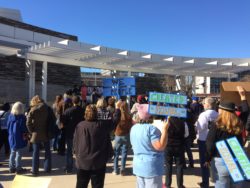June, 2022 Monthly Reflection
June 2, 2022“That they all may be one.” John 17:21
By Margaret Louise Brown
 Christ’s Farewell Discourse, as written in the Gospel of John, shares His final request. That humans live together as one.
Christ’s Farewell Discourse, as written in the Gospel of John, shares His final request. That humans live together as one.
At the same time, the Bible reminds us that humans are easily distracted by their desire for worldly values: power, money, status, possessions, etc. It also reminds us of the need to guard against seeking for oneself and to maintain a focus on the needs of all.
When the gifts given to us at our creation are developed and used, some will excel in the Arts and Sciences or Business and Leadership. Yet, others will become the heartbeat of our lives; excelling in Support, Service, Implementation, Conservation, Family life, etc. “We can’t have one without the other” (to paraphrase a song). We were created to be a harmonious, interlocking puzzle which, if one or more pieces are diminished, the picture becomes unbalanced.
The “haves” and “have nots” have existed throughout human history. Because of our innate human weaknesses, we tend to value self-preservation over preservation of humanity as a whole. Whether that self (family) preservation is driven by fear, greed, or other personal motives, the result has allowed for sub-categories of humans – those who don’t have as much value, whose voice doesn’t count. As such, they can be used for the benefit of those who perceive themselves as having the “right” to control others, even unto death.
Sociologists have long identified the passage from common good to self-preservation begins when members of a particular society no longer need one another for survival. In the United States, some would say that happened after World War II, with the establishment of the Middle Class, when society’s economic slogan moved from, “A chicken in every pot” to “two cars in every garage.” Then came the implementation of the Trickle Down economic theory of the 1980s. Studies now show that the theory failed due to human nature. On average the benefits of implementing the theory stayed at the highest level of business: the owners, their families, and up to three management levels down in the organization. The workers themselves not only didn’t benefit from the “rising tide,” they fell behind, and wealth inequity only increased.
Greed, desire for power, fear, anger, despondency, and resurgence of “rugged individualism” have become primary drivers in society today. The prevalent message seems to be that it is okay to categorize, to demean, to abuse, or to traffic others, for one’s own benefit; to keep what one has, make sure “ours” are taken care of first, or to get what we want. Regardless of how it affects the other.
Is Jesus’s desire still doable?
Jesus’ desire is still relevant, still doable. Some may say it is impossible to change the power dynamics of our society, but I don’t agree. I believe there are good people who believe in Jesus’ plea to His Father, whether by inherent belief or from the teachers in their lives. Unfortunately, the noise of the world has muted their voices. Some see the tide so strong against the good, they have given up.
But it is never too late for God. What He requires is like-minded people to push back against self-focused policies and belief systems. New prophets must emerge, believing the words from Luke 12:12, “For the Holy Spirit will teach you, at the moment, what you should say.” We are all called to be voices for good—for the common good. Polarized mass media has, for the most part, hijacked public messaging, but we have God-given gifts to work together to move the needle toward the good. It only requires us to take the risk and speak up.
Like the Victory Gardens of World War II, we must believe that our individual contributions can make a difference. Take time out of your busy schedule to find one initiative to engage in. Speak out to the people in your community and to leaders, both locally and nationally. If each one of us would take a step, we will, God willing, truly live the great experiment of our American democratic republic, “One nation, under God, indivisible, with liberty and justice for all.”
In other words, “We are all one.”
Category: Monthly Reflections

